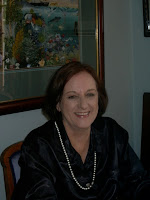A month ago—in South Africa, just to ground the reader—I had to pack up my house and studio in Port Elizabeth and relocate to Durban. In the process, I came across stuff I’d written when I was about eighteen. All the writing from my early teenage days must have been binned at some point, since, at eighteen, I was clearly past rubbish writing. I do recall being convinced that my romance novel, grandly titled, Inner Flame, was going to be a best seller—no question about that. One look at this title and you realize it doesn’t get much more purple than that. God help the poor soul who dares venture between those pages, but I can laugh at myself and did indeed go there. Let’s say it wasn’t really a venture, but rather a stumble over purple prose, a million adjectives and adverbs, and fat grammatical and spelling errors (no spellcheck back then). The head-hopping alone made my head spin.
Then I got married and nothing much happened because I was too busy breeding. I found more manuscripts, written when I was about thirty. I was clearly done with procreation, and I had a divorce under my belt. This second stab at writing was an improvement, but still no cigar for good writing.
The point of this trip into the past? Editors aren’t born writing with skill.
To be honest, if Inner Flame came across my desk now, I would probably send the writer every tutorial IFW has, including a thousand writing links on Google, and then tell them to go hide in a cave and learn to string at least one coherent sentence together before wasting their money on an editor.
Here are a few pearls from Inner Flame. I left the spelling errors in, even though MS Word kindly changed them for me. I must have been fixated on the size of the room, since I sure didn’t need full stops. This was all handwritten before I finally scored a wondrous typewriter.
Felicity walk down the wide stairs to the room below, it was a vast ball room hung extravigantly with chandeliers, the floor was glossy marble, Victorian furniture was arranged in it a large grand piano of oak stood at the far end of the room like a majestic queen of furniture, heavy curtains of deep red velvet adorned massive windows and french doors.
The chandeliers must have smiled from above to see this pink whisp of a girl almost float accross the huge room, she might have been a thistledown in a field for all she compared in size to the room.
Here is another gem:
Felicity was a long time in falling asleep, she lay between the soft linen sheets staring out of huge windows at the moon, clouds drifted like silver ships across her face, as round as a disc.
I could go on, but I would hate to hear a reader had died from laughing. The head-hopping examples of my eighteen year-old brilliance will take too much space, so I won’t bore you with those pearls of delight. You will just have to trust me that they’re there with oak-leaf clusters.
I now challenge our other editors to expose their badly-written-gems’ bellies to the public.
Surely, if we once wrote this poorly, there’s hope for you. If you need help bringing your writing up to the next level, email us at IFWeditors@gmail.com. Besides simply editing your work, we explain why we’ve made the suggestions we make so you learn as you go. Need even more help? We offer coaching, which is a personalized tutoring service that teaches you the things we’ve learned over the years. One client told us she learned more from one of our edits than an entire MFA program in creative writing. We’re here to help. All you have to do is ask.


